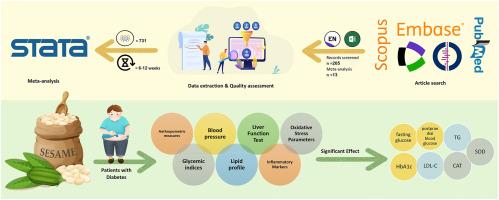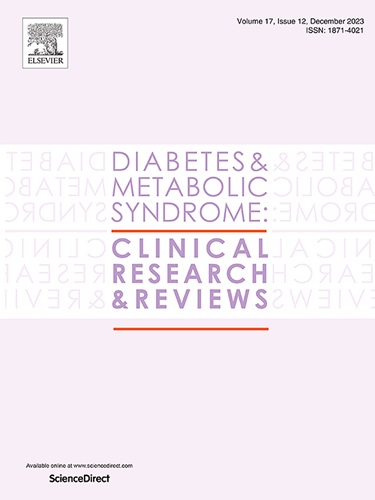芝麻(Sesamum indicum L.)产品及其生物活性化合物对糖尿病患者心血管疾病危险因素的有益作用:一项grade评价的系统评价和荟萃分析
IF 3.4
Q1 ENDOCRINOLOGY & METABOLISM
Diabetes & Metabolic Syndrome-Clinical Research & Reviews
Pub Date : 2025-06-01
DOI:10.1016/j.dsx.2025.103264
引用次数: 0
摘要
本系统综述和荟萃分析旨在评估补充芝麻对糖尿病患者血糖控制、血脂、人体测量、肝酶、炎症生物标志物、血压和氧化应激参数的临床效果。方法系统检索截至2024年8月的Scopus、PubMed、Embase、Web of Science、Cochrane Library等数据库。符合条件的研究评估了芝麻补充剂对心血管疾病危险因素(cvd)的影响。采用随机效应模型计算95%置信区间(ci)的加权平均差(wmd)。研究质量和证据强度分别采用Cochrane偏倚风险工具和推荐、评估、发展和评价分级(GRADE)方法进行评估。结果分析了13项研究,包括731名参与者,干预时间从6到12周不等。添加芝麻显著降低空腹血糖(WMD =−28.48;95% ci: 37.66,−19.30;P & lt;0.001),血红蛋白A1c (HbA1c) (WMD = - 0.98;95% ci: 1.95,−0.02;P = 0.045),餐后血糖(WMD =−15.90;95% ci: 21.59,−10.20;P & lt;0.001),低密度脂蛋白胆固醇(LDL-C) (WMD =−29.72;95% ci: 47.88,−11.55;P = 0.001),总胆固醇(TC)(大规模杀伤性武器=−32.76;95% ci: 52.69,−12.84;P = 0.001),甘油三酯(TG) (WMD = - 33.46;95% ci: 51.55,−15.37;P & lt;0.001),过氧化氢酶(CAT)显著升高(WMD = 3.41;95% ci: 2.86, 3.96;P & lt;0.001),超氧化物歧化酶活性(SOD) (WMD = 2.76;95% ci: 2.30, 3.22;P & lt;0.001)。本系统综述和荟萃分析表明,补充芝麻可显著改善糖尿病患者的心血管疾病危险因素,强调其作为控制糖尿病相关并发症的补充饮食干预的潜力。本文章由计算机程序翻译,如有差异,请以英文原文为准。

The beneficial effects of sesame (Sesamum indicum L.) products and their bioactive compounds on cardiovascular disease risk factors in patients with diabetes: A GRADE-Assessed systematic review and meta-analysis
Objectives
This systematic review and meta-analysis aimed to evaluate the clinical effectiveness of sesame supplementation on glycemic control, lipid profile, anthropometric measures, liver enzymes, inflammatory biomarkers, blood pressure, and oxidative stress parameters in patients with diabetes.
Methods
A systematic search was conducted in Scopus, PubMed, Embase, Web of Science, and the Cochrane Library up to August 2024. Eligible studies evaluated the effects of sesame supplementation on cardiovascular disease risk factors (CVDs). Weighted mean differences (WMDs) with 95 % confidence intervals (CIs) were calculated using a random-effects model. Study quality and evidence strength were assessed using the Cochrane Risk of Bias tool and the Grading of Recommendations, Assessment, Development, and Evaluation (GRADE) approach, respectively.
Results
Thirteen studies, including 731 participants with intervention durations ranging from 6 to 12 weeks, were analyzed. Sesame supplementation significantly reduced fasting glucose (WMD = −28.48; 95 % CI: 37.66, −19.30; P < 0.001), hemoglobin A1c (HbA1c) (WMD = −0.98; 95 % CI: 1.95, −0.02; P = 0.045), postprandial blood glucose (WMD = −15.90; 95 % CI: 21.59, −10.20; P < 0.001), low-density lipoprotein cholesterol (LDL-C) (WMD = −29.72; 95 % CI: 47.88, −11.55; P = 0.001), total cholesterol (TC) (WMD = −32.76; 95 % CI: 52.69, −12.84; P = 0.001), triglycerides (TG) (WMD = −33.46; 95 % CI: 51.55, −15.37; P < 0.001), and significantly increased catalase (CAT) (WMD = 3.41; 95 % CI: 2.86, 3.96; P < 0.001), and superoxide dismutase activity (SOD) (WMD = 2.76; 95 % CI: 2.30, 3.22; P < 0.001).
Conclusions
This systematic review and meta-analysis suggest that sesame supplementation significantly improves CVD risk factors in individuals with diabetes, highlighting its potential as a complementary dietary intervention for managing diabetes-related complications.
求助全文
通过发布文献求助,成功后即可免费获取论文全文。
去求助
来源期刊

Diabetes & Metabolic Syndrome-Clinical Research & Reviews
ENDOCRINOLOGY & METABOLISM-
CiteScore
22.90
自引率
2.00%
发文量
248
审稿时长
51 days
期刊介绍:
Diabetes and Metabolic Syndrome: Clinical Research and Reviews is the official journal of DiabetesIndia. It aims to provide a global platform for healthcare professionals, diabetes educators, and other stakeholders to submit their research on diabetes care.
Types of Publications:
Diabetes and Metabolic Syndrome: Clinical Research and Reviews publishes peer-reviewed original articles, reviews, short communications, case reports, letters to the Editor, and expert comments. Reviews and mini-reviews are particularly welcomed for areas within endocrinology undergoing rapid changes.
 求助内容:
求助内容: 应助结果提醒方式:
应助结果提醒方式:


